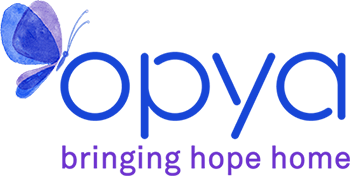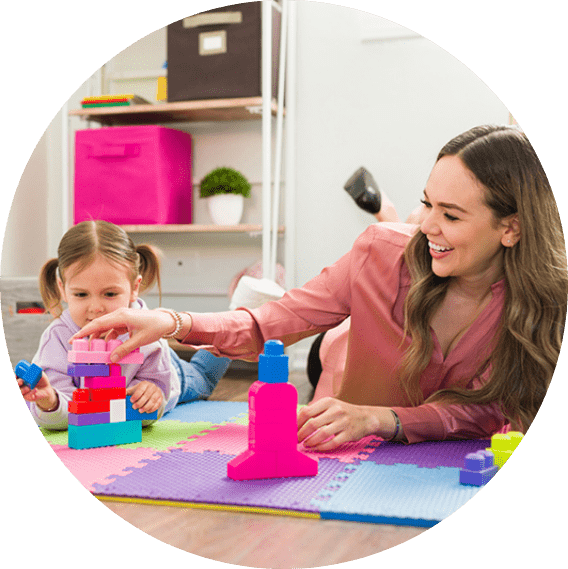FAQs
We have included some of the most frequently asked questions about Opya and our autism therapy services to help guide you through your child’s treatment journey. If you have additional questions, please contact us via chat or call us at (888) 300-OPYA (6792).
Frequently Asked Questions
A: Opya is a specialist in early intervention therapy for children diagnosed with autism and as young as 18 months old up to 6 years old. We provide ABA therapy in your own home, and accompanied by speech, occupational, and feeding services via telehealth. By combining exceptional clinical treatment with the best of digital technology, Opya is changing how autism care is delivered for children newly diagnosed with autism and transforming the lives of neurodiverse children and their families.
A. Opya serves families in Northern California (San Francisco Bay Area, Greater Sacramento Area, and Central Valley), as well as in Southern California (Orange County, and parts of Los Angeles County).
A. We are currently in-network with the primary commercial insurance plans in California, including Aetna, Anthem Blue Cross, Beacon, Blue Shield/Magellan, Cigna, Health Net/MHN, Health Plan of San Mateo, Health Plan of San Joaquin, Optum/United Healthcare, and Kaiser (Catalight).
A: With Opya, you can begin autism therapy services in just a few steps:
Step 1: Our Getting to Know Your Child and Intake Completion
Speak with our Client Services team to determine if your child would benefit from our early intervention autism therapy model. Complete our intake process, which includes a courtesy check on your insurance coverage to ensure treatment is covered.
Step 2: Assessment and Treatment Plan Creation
One of our board-certified clinicians will conduct a comprehensive assessment of your child to develop a personalized treatment plan tailored to your child’s specific needs.
Step 3: Care Team Assignment and Ongoing Treatment
Receive a therapy schedule for your child, meet your clinical care team, and begin daily treatment sessions. We will also provide regular parent trainings and resources to support you in your child’s treatment journey.
Reach out today using our online form or call us at [Direct] to get started today.
A: Because every child diagnosed with autism is different, therapists must employ treatment solutions that take the child’s unique circumstances into account. At Opya, we pride ourselves on our multidisciplinary approach to autism therapy, which draws on the expertise of a variety of professionals, including occupational therapists, speech-language pathologists, and behavior analysts. This comprehensive approach allows us to develop an individualized treatment plan for each child in our care.
A: At Opya, we offer multiple autism therapy services that we tailor to meet the needs of the child in our care. From speech therapy (ST) and occupational therapy (OT) to help your child better communicate and function, to applied behavior analysis (ABA therapy) to address problem behaviors, our autism therapy services are designed to make a real difference in your child’s life. In addition, we offer family support services to help you and your loved ones better understand and support your child.
A. Applied behavior analysis (ABA) is the application of the principles of behavior. ABA focuses on improving positive behaviors and eliminating negative behaviors to teach a variety of skills (communication, adaptive skills, feeding, toilet training). Interventions using applied behavior analytic principles have long been established as effective approaches to increase appropriate behaviors and decrease problem behaviors for individuals with autism spectrum disorder.
A: Speech therapy can help children diagnosed with autism who may be nonverbal or have difficulty communicating to develop critical communication skills, improve social interactions, and reduce problem behaviors. Speech therapy can also help improve a child’s quality of life in a broader sense. Studies have shown that children who receive speech therapy are more likely to have better social relationships than those who do not. Children who begin speech therapy early are also more likely to successfully integrate into an elementary school program, which is one of our primary goals at Opya.
A: Children diagnosed with autism may have difficulty participating in activities of daily living, such as dressing themselves, eating, or playing. Occupational therapy can help improve a child’s ability to participate in these activities by teaching them skills such as how to dress themselves, use utensils, and play with toys.
Occupational therapy can also help reduce problem behaviors associated with autism. By teaching children coping and problem-solving skills, occupational therapists can help to reduce meltdowns, tantrums, and self-injurious behaviors.
A: Feeding problems are common in children diagnosed with autism. These concerns can manifest in several ways, including:
Difficulty eating certain textures or flavors of food
Difficulty chewing or swallowing
Picky eating
Refusal to eat
Feeding therapy can help children diagnosed with autism develop the skills they need to eat a variety of foods and improve their overall nutrition. We work with children to help them overcome aversion to certain textures and flavors of food and learn how to chew and swallow properly.
A. Autism spectrum disorder (ASD) is a neurological and developmental disorder that affects how people interact with others, communicate, learn, and behave. Although autism can be diagnosed at any age, it is described as a “developmental disorder” because symptoms generally appear in the first two years of life. As children impacted by autism become adolescents and young adults, they may have difficulties developing and maintaining friendships, communicating with peers and adults, or understanding what behaviors are appropriate or expected in school or on the job.
In July 2022, JAMA Pediatrics revealed a new study that approximately 1 in 30 children in the U.S. is diagnosed with an autism spectrum disorder (ASD).
A. Autism spectrum disorder (ASD) affects brain development, impacting how children perceive the world and interact with others. Researchers have made strides in identifying various symptoms; however keep this in mind that symptoms of autism in children present differently in everyone. Avoid comparing your child’s symptoms to another child’s, and speak with a licensed physician or psychiatrist.
Social Behaviors
Your child may avoid looking at you, not enjoy interacting with you, or dominate conversations on subjects they are interested in. They may feel uncomfortable initiating conversation or not pick up on how others feel.
- Makes little or no eye contact
- Doesn’t respond when someone calls their name or speaks to them
- Doesn’t speak or has delayed speech
- Speaks in an unusual tone of voice, such as sing-song or flat and robot-like
- Lacks facial expression or makes facial expressions that don’t match the situation
- Fails to point or show objects to others
- Has difficulty starting or holding a conversation
- Enters conversation inappropriately, i.e., with aggressive or disruptive behavior
- Has difficulty recognizing and responding to nonverbal cues, i.e., other’s facial expressions or posture
Restrictive Behaviors
Another defining characteristic of autism is restrictive, repetitive behaviors and interests. Children diagnosed with autism may be insistent on sameness, such as completing the same tasks in the exact same order every time. They may feel anxious or frustrated if something breaks their routine. These behaviors can be problematic in everyday life and affect their ability to engage in social and leisure activities.
- Making repetitive movements (spinning, rocking, flapping hands)
- Performing self-harming behaviors such as biting or head-banging
- Repeating words or phrases (echolalia)
- Demonstrating an intense interest in certain topics such as mechanics or an era in history
- Being overly focused on certain objects, such as moving or spinning parts of a toy
- Getting upset by a change in routine, even if it seems small
- Being more or less sensitive than others to light, sound, touch, and temperature
- Only eating specific foods or refusing to eat foods with a certain texture
Difficulties with Speech and Language
Many children diagnosed with ASD struggle to express their thoughts and feelings and to communicate with others. Similar to difficulties with social behavior, speech and communication problems can cause a child great frustration.
Sensory Problems
Although sensory problems are not part of autism’s official diagnostic criteria, many children experience sensitivity to outside stimuli, making them feel uncomfortable, anxious, or afraid.
A. If you believe your child is not reaching their milestones, the recommended first step is having them screened by a medical professional to check for any developmental delay. A screening is not a diagnosis, but can show whether a child is on the right development track.
If a screening identifies an area of concern, a formal developmental evaluation may need to be performed by a trained specialist, such as a developmental pediatrician, child psychologist, or clinical psychologist. The results and diagnosis will help you understand whether your child needs special treatments or early intervention services.
Getting a diagnosis also depends on your child’s age and where you live. If your child is under 3, see your pediatrician or seek out a trained specialist. If your child is school-aged, you can ask your school district for a developmental evaluation.
Waitlists of several months to receive an evaluation and diagnosis is common. Remain patient and know the diagnosis will not change who your child is. It is simply a way of helping you understand your child and how to best support them.
A. Congress established early intervention (EI) services in 1986 as part of the Individuals with Disabilities Education Act (IDEA). EI provides a variety of services for children from birth until age six intended to promote positive growth in physical, emotional, cognitive, and social development. IDEA requires that children suspected to have developmental delays receive a comprehensive developmental evaluation to determine whether or not they qualify for speech, occupational, and/or physical therapy; psychological; vision and audiology services; and more. In some cases, an Annual Family Program Fee (AFPF) may be accessed.
A. The American Academy of Pediatrics recommends children be screened for autism between 18 and 24 months to benefit from early intervention therapies, like ABA therapy.
Autism spectrum disorder (ASD) may be diagnosed at an earlier age, about 14 to 16 months. Parents may notice atypical behaviors or developmental delays just a few months into a child’s life. However, many children are not diagnosed until they present more obvious symptoms around the age of 18 months or older.
A. Research shows that the most effective treatment to improve outcomes (e.g., adaptive behaviors, communication skills, cognitive abilities) for children diagnosed with ASD is through comprehensive early intervention programs. Early intervention autism therapy aims to bridge the gap between a child’s current functioning and that of their same-age peers.
A. We specialize in early intervention autism therapy for children 18 months up to six years of age.
A. Over 30 years of research has demonstrated the effectiveness of ABA therapy for individuals with autism spectrum disorder (ASD). Children who receive early, intensive behavioral intervention (EIBI) have demonstrated positive improvements in their development. Areas of improvement typically include communication, socialization, following instructions, daily living skills, etc.
A. The ABCs of ABA are:
A – Antecedent (what happens before the behavior)
B – Behavior (observable and measurable action)
C – Consequence (events that follow a behavior)
A. ABA therapy can help with the following:
- Communication skills: language, social skills, conversation, reading and writing.
- Daily living skills: toileting, dressing, fine motor skills, personal self-care, domestic skills.
- Problem behaviors: self-injury, noncompliance, aggressive behaviors, self-stimulatory behavior, property destruction.
A. Early intervention ABA therapy at Opya is completely individualized. There is no one-size-fits-all treatment plan because each child is different and unique. Each treatment plan is written to meet the needs of the child. A board-certified behavior analyst (BCBA) will design and oversee the plan to address the child’s skill needs, deficits, interests, as well as family preferences. These are all used to determine treatment goals in different skill areas. We use multiple assessment tools to ensure that programming is progressing. Goals are adjusted as the child progresses, and the BCBA will meet regularly with the family for parent/caregiver training.
A. Our dedicated intake team can help you navigate the terms of your insurance policy. Your plan type determines which benefits may be available to you. The State of California has a specific autism mandate, which requires certain insurers to provide coverage for autism spectrum disorder. The mandates require all health care service plans that provide hospital, medical, or surgical coverage to provide coverage for behavioral health treatment for pervasive developmental disorder or autism. Treatments include professional services and treatment, including applied behavior analysis and evidence-based behavior intervention programs, which include speech-language pathology and audiology.
A. It is never too late for someone to benefit from applied behavioral analysis (ABA)! In addition to providing one-on-one therapy to help your child reach their greatest potential, Opya can offers parent training to equip you to handle challenging behaviors, promote your child’s language and social growth, and optimize your connections with your child.
A. We offer and require parent/caregiver training. We train and support you in techniques and programs to use at home, and we can help address issues occurring outside of therapy sessions. As a parent/caregiver, you are a critical participant in your child’s autism treatment.
A: All individuals receiving treatment have the right to access treatment in their primary language. When possible, Opya will assign a clinical team that can communicate with the client and family in their primary language. Please let us know your preferred language for oral and written communication. Translation services are provided through your healthcare plan in any language, and when requested, Opya will work with your payor to provide interpreter/translation services.



